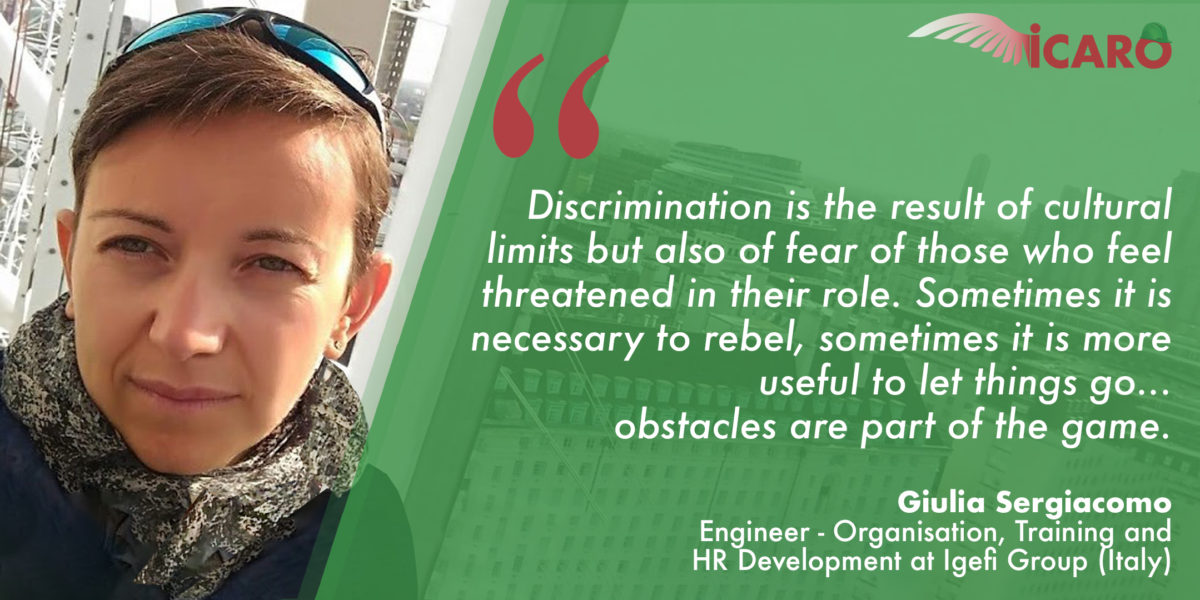Formedil recently interviewed Giulia Sergiacomo, engineer who has worked in the construction sector for more than 15 years. The Icaro team had the pleasure of meeting Eng. Sergiacomo during a webinar of the Erasmus+ project Women can build.
What is your academic and/or professional background? And how many years of work/study experience do you have?
I have a Master degree in Environmental and Territorial Engineering and I worked for 17 years in the construction sector within the company Di Vincenzo Dino & Ceit Spa, a general contractor operating throughout Italy: the first 7 years I was working on sites in the Geotechnical Division, while the following 10 years as Head of the Management System for the areas of Safety, Environment, Quality, and Social Responsibility.
Since June 2020, I have been working in the Personnel Management of Igefi, the entrepreneurial group of reference of Di Vincenzo & Ceit Spa, a leading company in the telecommunications, plant engineering, and energy sector. The whole entrepreneurial world is aware that the future is extremely complex, also because of a global context in constant and rapid evolution: the Igefi Group has chosen to respond to this challenge and to invest in a project of Organisation, Training and Development on human capital, because it firmly believes that it is people who will make the difference. This is the project I am working on today.
Why did you choose to study subjects related to the construction sector?
I chose to study engineering for two main reasons. The first was the desire to cultivate my natural inclination for scientific subjects; the second was the desire to choose a faculty capable of opening up concrete employment horizons. Even today, after all, there is still a great demand for engineers willing to get involved in the world of work.
In your opinion, is the career path in construction different for men and women? If so, why?
Of course it is. There are many reasons. The first reason, which is indisputable, is that it is a historically male-dominated sector, partly because the heavy work of the workers is not really suitable for women. There are also cultural and social reasons. However, I can say that the situation today is much more evolved than in the past: the percentage of women working both on construction sites and in technical offices has increased considerably. There is still a very strong male hegemony in management and top positions, but this condition is also the result of a cultural emancipation process that is still too young.
Are there professional profiles more suitable for men and/or women?
If you put the question in this way, the answer is yes and it goes without saying. But I would like to take this opportunity to give a different explanation: the same professional position is interpreted differently by men and women. And this is why a healthy assortment, within the team, is an element of strength and balance for work processes.
Do you think that the media (or society in general) has some sort of influence on the choice of career path?
Of course. With some exceptions, the context in which a young person grows up plays a fundamental role in the choice of career path. The media – but nowadays I would also say the mass media – have an enormous role and responsibility. Promoting and rewarding competence, commitment and seriousness, teaching mutual respect, teamwork and the achievement of shared goals, cultivating the growth of independent thinking and coherence with one’s principles: these are the premises from which we can start to build a sustainable future and a competitive country.
Have you experienced incidents of discrimination based on gender, age or other reasons? If not other colleagues?
Of course I have. Discrimination is the result of cultural limits but also of fear of those who feel threatened in their role. Sometimes it is necessary to rebel, sometimes it is more useful to let things go… obstacles are part of the game.
What advice would you give to construction companies to make a more inclusive workplace? And to women looking for a job in this field?
More than advice, I would issue two challenges. To companies, the challenge to offer women real opportunities, also in terms of reconciliation with family life, because their irreplaceable social role must never be forgotten. To women, the challenge to get involved, without losing their identity and without letting themselves be held back by useless forms of recrimination about what should be, but is not.

